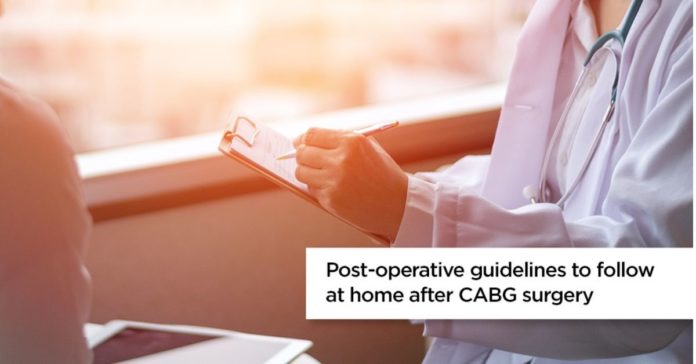OVERVIEW
Coronary Artery Bypass Grafting (CABG) is a type of surgery that helps improve the flow of blood to the heart. The surgery is used for individuals who have severe coronary artery disease. CAD is a condition in which, a substance called plaque builds up inside the coronary arteries. Plaque can block or narrow the coronary arteries and reduce the flow of blood to the heart muscle. If the blockage is severe, angina, shortness of breath, and, in few cases, a heart attack may occur.
We know that going back home after heart surgery can be a great relief, but it can also be quite overwhelming. Remember, you are not alone. We are here with you in each of your step towards recovery.
CARE AT HOME AFTER BYPASS SURGERY
Care after a bypass surgery includes standard guidelines that may help you take care of yourself after your surgery.
- Medications: Most individuals who have undergone bypass surgery are sent back home with prescriptions for several medicines, most of which are taken every day. Please ensure you keep adequate stock of medications and take them as prescribed without fail. In case you have to order, call our pharmacy helpline 1860 500 1066
- Wound care: After discharge from the hospital, you are generally given all the important instructions on how to take care of your chest, hand and/or leg wounds. It is critical to carefully follow these instructions. If you develop any of the following signs or symptoms of wound infection, contact your treating doctor immediately.
- New or worsening pain around the incision or in the chest
- Discharge from the wound
- Bleeding, reddened skin, or pus-like drainage from the wound
Avoid the use of scented (perfumed) soaps, powder, or creams on your wound area as this can cause irritation. Do not scratch the would area and keep washing your hands regularly to avoid any infections to the wound
REDUCE CARDIAC RISK FACTORS
Follow a heart-healthy diet: Follow the diet and nutrition advice given to you at the time of discharge. A heart-healthy diet involves high fiber, whole grain, protein-rich, and low-fat foods. Eliminate unhealthy fats, refined carbohydrates, and sugar. If you want to learn more about your diet, connect with our diet and nutrition specialist. call 1860 500 1066 to schedule an appointment.
Stop smoking: If you are a smoker, quitting is essential to healing better. Cigarette smoking increases the risk of heart complications significantly. Patients who continued smoking had nearly twice the risk of coronary heart disease, heart attack, and stroke compared to those who did not smoke.
Manage diabetes: People with diabetes are at a higher risk of developing complications after bypass surgery. Good control over blood glucose levels can reduce the risk of heart diseases and other types of complications. Diabetes can be controlled well by losing weight, managing diet, regularly monitoring the blood glucose levels, and taking the medications as prescribed.
Keep a check on your Hypertension (high blood pressure) and High Cholesterol: High blood pressure is a known sequela of bypass surgery. After bypass surgery, blood pressure can go up. Your treating doctor will recommend medicines to control high cholesterol and Hypertension as a part of your medication protocol. It is important to take these medications exactly as prescribed.
Constipation: This is the most common problem after your surgery. Painkillers and changes in the diet and routine are the leading causes of constipation. Returning to normal eating habits may often help bowel patterns to come back to normal. Stay sufficiently hydrated and include vegetables, fruit, and fiber (like brown rice, cereals, brown bread, etc.) in your diet. Speak to your treating doctor about your medicines, if constipation continues to be a problem.
Handling Depression: Up to 40 percent of people experience feelings of depression and anxiety after bypass surgery. Stay positive and be happy as depression is also a risk factor for heart disease. Good reading, meditation, and positive thoughts can help tide over. If you are still experiencing any of these conditions after your surgery, seek help, Contact us 1860 500 1066 to fix an appointment with our clinical psychologist team.
Exercise: Regular exercise improves cardiovascular health consistently. It helps you regain cardiovascular fitness and return to everyday activities. But importantly, the first step in starting to exercise is to understand the potential risk of heart and blood vessel complications from exercise. Your treating doctor may advise on the intensity and duration of exercise depending on the severity of your heart disease. It is recommended to avoid lifting heavy weights and exercise with extremes of shoulder movement, such as lawn tennis, badminton, golf, etc. for six to eight weeks after surgery to allow for complete healing of the sternum (breast bone).
FOLLOW-UP CONSULTATIONS
Do not miss the scheduled follow-up appointment with your treating doctor. We now have facilities for connecting you with your treating doctor. For teleconsultation, call 1860 500 1066.
If a physical check becomes necessary, follow these tips:
- Call 1860 500 1066 to check for your doctor’s availability
- Carry all your report and appropriate documents from your hospital/treating doctor
- Only one attendant will be allowed with you within the hospital
- Wear a mask throughout your visit to the hospital
- Apply for a curfew e-pass online for your medical consultation as per the state government’s norms
While you must be having your scheduled review with your treating doctor, in case of the following conditions/situations, do not wait for your scheduled visit and call 1066 without delay
- Giddiness
- Palpitations
- Bleeding from nose
- Bleeding in urine
- Bleeding in motions
- Altered level of consciousness
- Breathing difficulty
- Fever higher than 100.4º F (38º C)
For any other query, call: 1860 500 1066


















